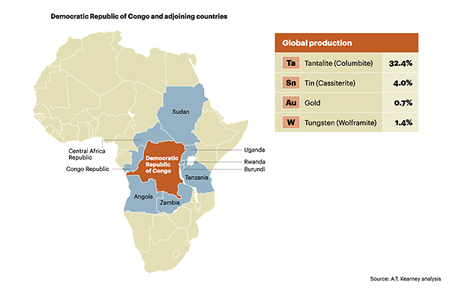Conflict minerals is a term used to describe minerals produced in certain countries that use the money from mining these minerals to support human rights abuses in their countries, as well as killings, violence, and rape. The major offender is the Democratic Republic of Congo.
The main minerals (the 3TGs) are tantalum, tin, tungsten and gold, which are used in many electronic components and computer products. Numerous companies working in the electronic component niche have developed rules for the use of these minerals and the buying of them from approved countries.
ECS Inc. and others have developed a policy as outlined below:
“ECS Inc. International understands the Democratic Republic of Congo (“DRC”) and the nine countries adjoining it (“Covered Countries”) are rich in natural resources. ECS also recognizes that some mining activities in certain regions/mines within the DRC and Covered Countries which are controlled by non-government military groups have been identified by the U.S. Government and other global and industry organizations as potentially contributing to human rights abuses and environmental damage within the region. ECS is committed to engaging in rigorous due diligence efforts designed to verify — whenever possible — the source of tin, tantalum, tungsten, and gold (“3TG Minerals”) used in ECS’s supply chain. ECS is committed to purchasing 3TG Minerals and other materials only from environmentally and socially responsible suppliers. ECS requires our suppliers to meet conflict mineral regulatory obligations in accordance with U.S. Government, as well as local regulatory requirements and to source 3TG Minerals only from conflict free sources”.
The Enough Project rates companies in the electronic component and jewelry businesses - the two leading users of the minerals (though not from conflict countries). Interestingly, Apple leads the list in their efforts to not use conflict materials. Google, HP, Microsoft and Intel round out the top five. “After that group, the electronics companies take a steep dive, with the next closest company, Panasonic Corp., only scoring 42.5 points and the lowest ranked electronics company, Toshiba Corp., at nine points,” (out of a possible 120), the Enough Project notes.
In the United States, Section 1502 of the Dodd/Frank Wall Street Recovery Act restricts use of these conflict minerals. Signed into law in July 2010, This section of the act “requires publicly traded companies to ensure that the raw materials they use to make their products are not tied to the conflict in Congo.”
contact us:
 EN
EN
 English
English
 Chinese
Chinese
 Italiano
Italiano
 Portuguese
Portuguese
 Deutschland
Deutschland
 French
French
 Russian
Russian
 Japanese
Japanese
 Turkish
Turkish
 Korean
Korean
 Spanish
Spanish
 my account & orders
my account & orders

